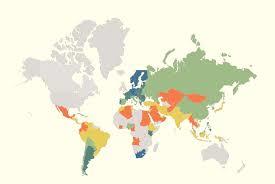EF Education First released the 2021 edition of its EF English Proficiency Index (EF EPI) on Tuesday, analysing data from two million non-native English speakers in 112 countries and regions. As worldwide levels of English improve, Scandinavia no longer dominates the top positions of this global ranking. The Netherlands held on to its number 1 spot by a comfortable margin.
Uzbekistan ranked 88th and was included in the Very Low Proficiency group. It was emphasized that this is the "average for the region." Uzbekistan neigboured with Albania 87th, and Syria 89th.
Kazakhstan was placed in 96th place, Kyrgyzstan - 101 and Tajikistan - 103. In all these countries, knowledge of the English language is also at a "very low" level. Turkmenistan was not added to the rating.
Russia took 51st place and there the level of knowledge of the English language is "average".
"Despite the decline in travel, English continues to facilitate cross-border communication and cooperation as well as enabling new modes of work. This year's EF EPI is more comprehensive than ever, providing valuable insights for governments to evaluate their language learning policies and highlight strategic areas to improve upon," said Kate Bell, Author of the EF English Proficiency Index.
The EF EPI is based on test scores from the EF Standard English Test (EF SET), used worldwide by thousands of schools, companies, and governments for large-scale testing as well as millions of individual test takers.
Key findings of the EF EPI 2021 include:
- Europe's English proficiency is consistently strong and climbing, driven in large part by improved proficiency among older adults.
- Central and East Asia are trending up while South Asia and the ASEAN countries have more mixed trajectories.
- Latin America's upward trend continues with improvements in three-fourths of the countries surveyed.
- North Africa continues to improve and a clearer picture of the rest of the continent is emerging as more countries are added to the index.
- Adults over 30 have improved most since last year, and those over 40 scored in the Moderate proficiency band for the first time. These trends highlight adults' ability to gain language skills throughout their careers.
- On average, most industries do not have strong enough English proficiency to work optimally (Moderate proficiency or higher). Education, government, and healthcare sectors remain at the bottom of the industry ranking.
- Men's English proficiency has outpaced women's for the first time, driven by a rise in men's proficiency levels.
- For the first time, the Democratic Republic of the Congo, Ghana, Haiti, Madagascar, Moldova, Mozambique, Somalia, South Sudan and Tanzania have sufficient data to be included in the index.














